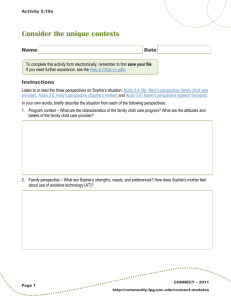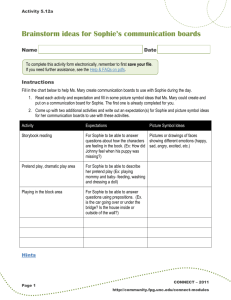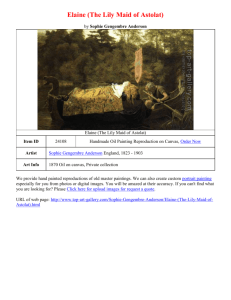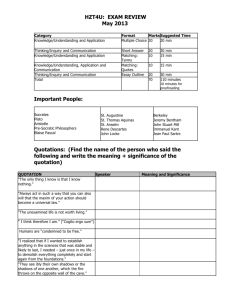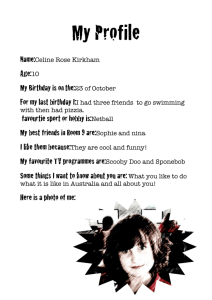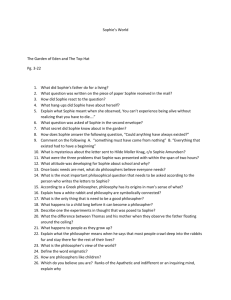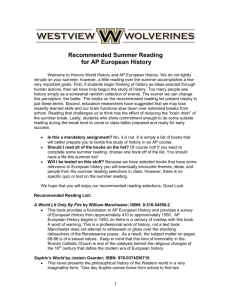01 How to survive 1st year 2009-2010
advertisement
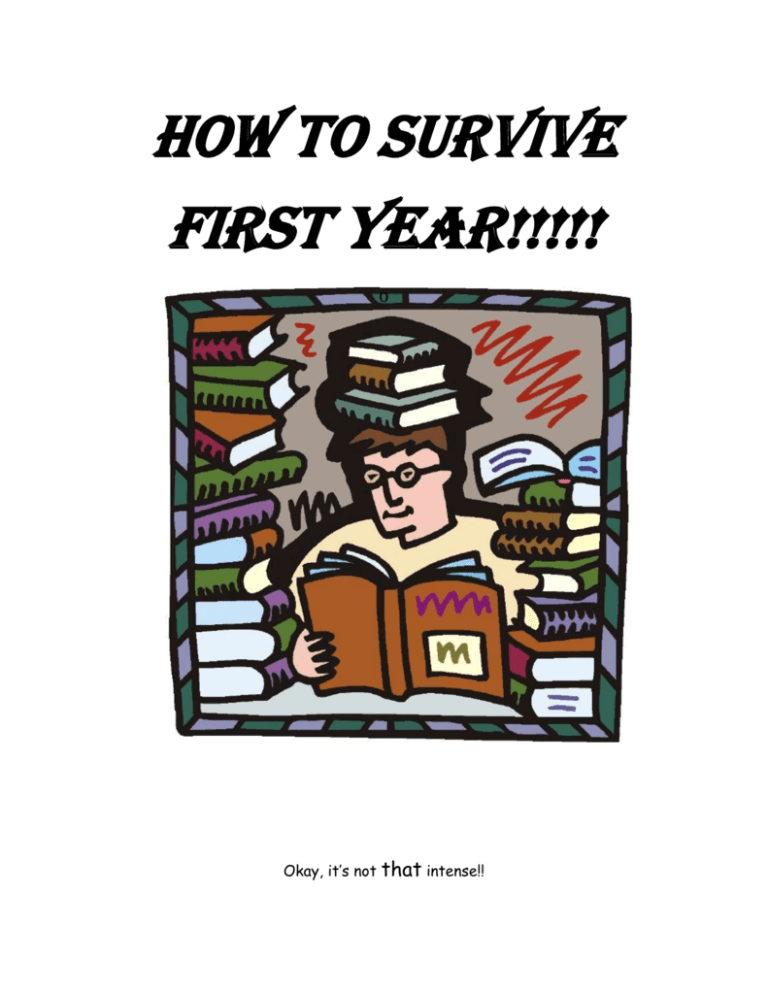
HOW TO SURVIVE FIRST YEAR!!!!! O Okay, it’s not that intense!! TABLE OF CONTENTS Topic Pages Where to Get Textbooks 3-5 Study Groups 5 Physics 6-8 Biology of Organisms 8-10 English 10-12 World Civilizations 12-13 New Freshman Seminar/Psychology 13-15 Research and Volunteering 15 Have fun! 15-19 Top 10 ways to Successfully Complete Your First Year 20 Hey everyone! We hope you’re enjoying Sophie Davis so far! This “How to Survive” guide is the first in a series of pamphlets written for Sophie’s MED courses. You will receive them as you begin taking each medical class, starting with General Chemistry in the spring. This guide will give you an overview into what you should know about your Sophie courses. The guide was written by all the people listed below, and in the case where individual advice was necessary, it is indicated as such. Good luck, and hope you enjoy your time at Sophie! How to Survive: Surviving First Year Amy Cilento (Class of 2013) Kenia Edwards (Class of 2013) Hector Florimon (Class 2013) Don-Andre Jackson (Class of 2013) Prince Odigie (Class 2013) 2 WHERE TO GET TEXTBOOKS The best and most efficient way to find textbooks is to ask the upper years. Most upper years are willing to sell their textbooks that they are not using anymore. If they do decide to sell their textbooks, you can see the condition of the book, as opposed to buying a used book online. And the prices are usually (not always) cheaper than other places. If it’s not possible to buy the book from an upper year, at least you will know the title and authors of the book and you won’t make the mistake of buying the wrong book. A good place to start for your books is in the bookstore, or on the CCNY bookstore webpage. Start here and search your courses to find the name, author, and edition of the book that your professors require. Here you can also see the prices of the used and the new books so you can reference them when you look elsewhere. If you want a discount on textbooks, plan early, because you don’t want the term to start when your book is in the mail. Consider buying used books to save some money but be careful when reviewing the condition of the book; some may have highlighting or notes written in them. The bookstore also sells the required books, organized by specific classes. However, they charge normal price, or slightly less for used books. If you want to keep a small budget, online is your best source. In case you didn’t know, ISBN numbers are the easiest way to search for books online, whether it is Amazon.com, Barnes and Nobles, half.com, or even eBay. Just copy and paste that ISBN in to check out prices. ISBN numbers are the ones near the bar code on the back of books. Borrowing books from upper years is also a cost-saving option. Amazon has free shipping, but it isn’t guaranteed to be fast, although it usually is. Barnes and Nobles has free 24 hour shipping in Manhattan, and a day or two more for outside Manhattan. At Barnes and Nobles, it is also possible to get student discounts for books, with your college ID. Half.com is a great way to find cheap textbooks with a variety of sellers from across the United States; in order to ship books faster, buy from a seller near the New York area. EBay’s shipping depends on the seller, and be sure that before bidding or buying, that the seller isn’t overcharging on the shipping and handling costs. Another great way to find textbooks is to visit Sophie’s student website, where current Sophie students are selling their books on the forums. You can also see an updated calendar of events, other helpful study tools, and much more. Sophie’s Student Site: http://www.mysdbooks.com 3 Starting in the fall of 2009, AMSA will be putting together a book donation and trade sale that would match upper years with younger students who wish to purchase book through their peers. This is a great way to purchase books because you can see the actual quality and take the book home with you once you pay for it. Getting older editions of books may be a lot cheaper, and for most classes, you don’t need the newest edition. You rarely need the CD-ROM that comes with new textbooks, and you can rarely buy a used textbook with the CD-ROM. But look at the dates between editions before making a decision. For example, if the second edition of a book was in 2004, and the third was in 2007, chances are, not much has been updated, so the second edition should be fine. But if the second edition was in 1990, and the third was in 2004, there probably is something significantly different in the newer edition, and you should opt for the updated book. But try to compare both editions first if you can, to see if you really need to shell out more for the newer edition. You can also ask the professor, although they’ll probably say to go for the newer edition. If you do get an older edition, you may have to do a bit of extra work in terms of correlating assigned readings for the new edition to the pages in your old edition. Aside from that though, there shouldn’t be a problem, but be careful before making a decision regarding which edition to buy. But remember; don’t buy these books yet, until you’re sure your specific course is using them. It’s kind of hard to know that with City College courses, but when you take Sophie courses, they let you know in advance what you need, so you can find the good deals online. STUDY GROUPS Different people have different ways of studying. Study groups help to reinforce and learn material you didn’t when studying on your own, and they also help you learn different techniques to approaching problems or a particular concept. Definitely try to form a solid study group early in the year, and keep that group as you progress through school. That’s not to say that you can’t let other people in, but once you get comfortable with a group, it will make studying that much more effective, and maybe even a bit more fun. You can have study groups with your friends, but just be sure that you actually get studying done, and not end up talking for the whole time. If you don’t have a group, ask your classmates, and try to form something early. Trust us, it’ll be really beneficial! Also, the best way to master material is to teach it to someone else, which is why study groups are helpful to those who have a strong grasp of the material as well. If you do decide to study with a group, try to keep a maximum of 4-5 people. You don’t want to have 20 people because that is no longer a study group; it’s a classroom. 4 If you are not the type who studies well in a group, just give it a try and it might turn out well. Remember, try to test different study habits out as early as possible in the year so that if it doesn’t work for you, you haven’t wasted too much valuable study time. The best way to study would probably be a mixture of self studying and group studying. Some people might need to study on their own before or after they get involved with a group. It is a good idea to remember what the group as a whole knows, is not necessarily what you may know on our own. PHYSICS For physics, the book you are using is Cutnell and Johnson’s Physics. There is a solution manual for selected questions also available, which may come in a package at the bookstore. Look around for better packages, because some sellers online may package a complete solution manual and other good resources with the text. The second year class put together the solutions manual online – some even have it on CDROMS or flash drives. If the book you purchase does not have the solutions manual with it, make sure to ask an upper year if they have a copy. Also, there are alternatively two volumes of the book, one for physics 203, and the other for physics 204. The main book listed above has both volumes, which you’ll need for both 203 and 204 anyway, but you can buy them separately if you like. You can save around $20 or more if you buy that combined volume, plus it’s hardcover, while the individual volumes are soft cover. A student study guide is also available, and it mainly has extra problems. Advice from Amy Cilento Physics 203 with Professor Chang was a pretty straight forward class if you sat in on all the lectures and read along with the textbook. Doing practice problems is by far the best way to learn – if you think you are comfortable with a topic just by reading the words, MAKE SURE to do problems (especially the ones within the chapter) so that you have a grasp on as many different types of questions as possible. If you pay attention to the questions emphasized in class, practice problems, and read the chapter until you understand it, you’ll be fine. Don’t fall behind on the formulas because there are a lot of them and the material starts to pick up in the middle of the semester – you don’t want to get left behind. I found that problems were helpful and I only read the chapters of things I didn’t understand – but if you don’t get the math or the concepts, DEFINITELY read the chapters before class. 5 Advice from Kenia Edwards: Personally, I didn’t do too well in Physics 203 because I never really studied or practiced any problems. So my advice to you is to STUDY and PRACTICE as many problems as possible. I think the best way to study physics is to immediately go over the class notes after the class. If you have a break after your physics class, that would be best. This way the information is fresh in your mind and you can think it all through because the class may move too quickly. Also you can write down anything you do not understand and ask the professor the following class or on your own time. DO NOT BE AFRAID TO ASK QUESTIONS. The last thing you want to be in physics is confused. As far as practicing problems: do not do the easy problems that give you all the information because your exams will be a surprise to you. Try to do the hard problems that test your understanding of physics. Advice from Hector Florimon: I found physics to be a self-taught course, using the lectures as a reinforcement to what I had learned. Lecture was my opportunity to ask questions on more difficult problems and my chance to see what the professor was placing emphasis on. The professor I had did skip some parts of textbooks while placing emphasis on medical applications of physics. Make sure to do all of the recommended problems and review problems done in class as well - generally those were the problems that showed up on the exam. Learning the difficult concepts is where the textbook comes in handy: it breaks down problems and gives examples easy to relate to. Definitely make a review sheet of formulas and figures, keeping in mind to take notes for the midterm and final. Use the internet for more than just music and social networking by looking up concepts on YouTube as a reinforcement. There are long (though very helpful) MIT lecture videos in physics and other subjects, but to save time seek videos under 10 minutes. Advice from Prince Odigie: For physics you should make sure you do questions after doing the readings, because without doing questions then you have no way of knowing if you have actually mastered the material. You should also use the professors, ask them questions and they will surely help you out. BIOLOGY OF ORGANISMS (BIO 207) The book you’re using for this class is The Hill, Wyse and Anderson’s Animal Physiology. Whether the professor relies heavily on lecture notes or not, reading the book is very important. It’s an easy read book, and parts of it are quite useful for the action potential section of Molecules to Cells I, which you will take 6 in the spring term of second year. It’s a good reference if you’re having trouble understanding a particular concept or something in class. However, the book does not cover some lecture material (i.e. photosynthesis), so students should rely heavily on lectures and class notes. Advice from Amy Cilento For my class, biology was ONLY based on lecture slides – for the first test, we had all read the textbook and focused a lot more on that then the lecture slides, got to the test and were all stumped. Fortunately, the first test wasn’t weighted much in our overall average so it was easy to come back from that. You need to get a sense of how your professor teaches and see whether it’s best to focus solely on the textbook or solely on the slides – the best bet is to reach a balance between the two. Lab reports and tutorials take up a lot of time in biology and count for a good percentage of your grade. Make sure to not put them off until the night before – if there was one thing I could change about how I approached Bio207 it would be labs. I tended to leave labs and tutorials until Wednesday night (when I had lab Thursday) and wasted a lot of sleep time cramming in the work. Make sure to get everything done in a timely fashion! Also, staying awake in class is a big portion of how well you do in bio – we had a 2 hour lecture that was pretty difficult to pay attention to at times. Reading the text book to supplement some things that you don’t understand is a helpful tool. Advice from Kenia Edwards: In biology, I didn’t have the textbook and I don’t believe that impaired my learning abilities. However, the professor based all of his tests on the lectures given in class. So all I needed to do was to study the lecture slides and I was good. He didn’t really give any surprises, so the lectures were enough for me. As with physics, you should study the material right after class if you can to reinforce the material. Also, study bio EVERYDAY. If you dedicate some time to studying the lectures daily, you will always be ready for the exams. Looking up ANIMATIONS is a very useful technique to studying bio. But the book might be very helpful for bio-lab. In lab, you will have to do tutorials and answer many questions which all the answers can be found in the textbook. Everyone will have to present tutorials and you should make them as fun as possible. Neither your classmates nor the T.A. wants to listen to a boring tutorial. Try to use images and animations. Advice from Hector Florimon: 7 Staying ahead in this class is the key to being successful. Often a chapter or more a week, it can be easy to fall behind if you do not plan to split up readings, making outlines, reviewing class notes, and preparing for lab. Concept mapping proved to be helpful in this class. For example, some questions asked required putting concepts together to determine changes and how to adjust accordingly in different systems. Tutorial sessions require careful attention and hard work, since it will be the chance to explain concepts as well as learn them from other students. Please make sure to rest well before lecture class so that you can stay awake (for almost two hours) and take good notes. If available, print out lecture notes before class so that you can supplement your pre-reading by skimming through them and bringing it to class to take additional notes on the slides. Advice from Don- Andre Jackson: I found Biology to be one of the toughest courses for the fall semester because I had not seen material relating to biology since 8th grade. Despite my own shortcomings, I was able to learn the material as long as I applied myself. Biology of Organisms is a very concept based course - mere memorization will not get you the A. The concepts that you learn in the beginning of the course come back at the end with greater detail. I found tutorial sessions helpful because it allowed me to ask questions to my lab instructor that I was not able to ask my professor. It is also helpful to print out the lecture slides before hand and skim them because it lets you know what the professor will be speaking about during the lecture; reading the lecture slides beforehand allows you to prepare interesting questions for your professor. There were only two exams and a final so try to do well on exams. Advice from Prince Odigie: For biology always make sure that you are up to date to in the class readings. Always try to read the lecture slides before class so you have an idea of what the professor will teach about. ENGLISH Advice from Amy Cilento Our FIQWS class was based on comic books, which was something I was totally unfamiliar with. But, the class was cool, after you got past the countless hours we spent analyzing every color and character on a page. The teachers were really into what we were being taught and that made going to class a bit easier. I had FIQWS from 8-10:45 Tuesdays and Thursdays and I was always pretty tired – make sure you get a 8 good night rest before some of the FIQWS classes so that you don’t fall asleep in class (try to avoid sleeping in class AT ALL COSTS! I’ve never fallen asleep in a class (although I have a lot more classes to take before I’m through at Sophie!) I think it’s so rude and I’m scared I’m going to get in trouble!!!). There is a lot of reading – even though we were reading comic books, we went through at least 100 pages a week. The writing portion of the class is intense – we had a 10 page research paper due at the end of the course but about a 5 page paper due each week. There is a lot of time that you need to put into this course but my teachers were fair in the end – they know you’re trying and that’s what counts. Make sure that if you don’t consider yourself to be a good writer that you adhere to the rubrics and approach your teacher with any questions you have, do drafts, and peer review/edit. With all the classes you’ll take in Sophie, email your professors – they’re very willing to help you along with your academic career. Advice from Kenia Edwards: I don’t believe we have the same subjects from English. I had Writing for Your Life: Literature and Human Rights. But my advice is to just do what the teacher asks. Make sure you do the readings so you can participate in class and write well written papers. Advice from Prince Odigie: Make sure you are always up to date in terms of your readings, because the professor might go fast in terms of reading pace. Don’t leave assignments for later; do them right away so that you are not left rushing at the last minute. When you get your final paper start, it early so that you can edit early and not be stressed out during finals week, because you have other finals to worry about like physics biology and world civ. WORLD CIVILIZATIONS Advice from Amy Cilento Our World Civ course was definitely the easiest course I’ve taken at Sophie so far. We were given possible test questions the first day of class that could be easily answered from the textbook. Then, the tests were the exact same questions as were given. The professor was incredibly interesting so going to lecture was fun. Also, in classes such as World Civ, attendance is taken each day so being present is important. 9 Advice from Kenia Edwards: With Syrakkos all you have to do is to DO THE ASSIGNED READINGS and PARTICPATE. Syrakkos loves to talk and her class is just discussing the readings. Once she knows your name and she likes you, you’ll probably going to get and A. As for her essays, DO NOT B.S. She can detect it, but she does like for you to express your opinions with support; if you can support it she is for it. Also for her essays, do not only write what she asks, SHE LOVES when you take things a step further. Her class is rather simple. Make sure to PARTICIPATE and I wrote it twice because it’s important!!! Advice from Hector Florimon: I tackled world civilizations by participating in class, taking organized notes (along with writing quickly and clearly), and recording the lectures. I did not spend much time on listening to lectures over again, since I found that I had already written down most of the important things. However, the recordings proved to be very helpful when writing papers and constructing essays. Overall, keeping a theme in mind when listening in class or for reading the textbook helps to organize the material and determine what material is most important. Advice from Don-Andre Jackson: World Civilizations is a course that is really dependent on the professor. In my first year my classmates had very different experiences with World Civ because of their teacher. My professor required very little of us reading wise; he lectured for the entire class and we would have a test a week later. The class itself was very engaging because our professor included us in many discussions. The textbook was necessary because we needed to read in order to prepare for our exams. Advice from Prince Odigie: Always make sure you are not left behind in terms of the readings. There are always essays that require you have read the materials assigned to you. Also make sure to ask questions and make comments during the class, professors like to know you are contributing to the class and always thinking. 10 NEW FRESHMAN SEMINAR This course is very similar to mastery learning in the summer program, except you usually meet once a week instead of four times a week. Attend every time and you’ll pass. Don’t, and you’ll fail. It’s graded on a pass/fail basis. Ms. Richardson is in charge of this course, and it’s actually quite interesting. You’ll have question and answer sessions with Sophie graduates, watch insightful movies like The Doctor, learn more about student government, clubs, and the honor code, and much more. You have to be there regardless of whether you want to or not, so why not take the opportunity to learn something? Advice from Amy Cilento NSS was a really interesting course if you took the time to listen to the stories of the invited lecturers. Just be sure to SHOW UP and you’ll pass. It’s that simple! Advice from Kenia Edwards: JUST GO! Attendance = Pass. Advice from Prince Odigie: Make sure you go because there is always valuable information given to you. It is during this class that you find out how to sign up for classes. The school did your registering for you during the fall semester but when the spring semester comes around you have to do it on your own. You also learn much other valuable information about Sophie Davis, you haven't already heard. For anyone taking Pyschology…. Advice from Don-Andre Jackson I was exempt from Physics 203 and 204 because of my AP Scores so instead I took psychology. Psychology is a City College course that all CCNY students are required to take as a result the lectures are filled with about 400+ students. The class is pretty much straight forward; the professor gives you a very detailed syllabus and opportunities for extra credit. The textbook is essential to answer homework 11 questions and is helpful for understanding the material. The professor also makes lecture slides available before class so during lectures you should be paying attention to the lecture not taking notes. Take advantage of the extra credit opportunities it can be the difference between an A and A-. RESEARCH AND VOLUNTEERING Sophie gives you a LOT of volunteering and research opportunities, and it’s to your advantage to use them. In addition, you can seek research and volunteer opportunities elsewhere. It’s important, both for your own personal growth, the medical school match, and afterwards, to have some experience in research, volunteering, or both. There is a volunteer board in the Sophie lounge that will update you on volunteer locations, as well as a club, SHOUT, dedicated to volunteer work. In addition, Sophie offers the Leonard Davis Fellowship, which places you at a site nearby school to work for 200 hours over the course of a year, and they give you a stipend. Likewise, the Rudin Research Fellowship places you with a Sophie faculty member to assist with their research for 250 hours over a year, and also gives you a stipend. Lastly, the Mack Lipkin Fellowship allows a third or fourth year student, before entering their next year, to pursue research abroad in another country, with all costs covered. Please be aware of these opportunities and use them to your advantage! I recommend that during the fall semester you shouldn't do research but take the time to see how you study and learn how to manage your time. You can volunteer as long as it doesn't interfere with your academics. I also recommend that before you volunteer you should already know yourself and realize how you study and how to manage your time well. HAVE FUN! Sophie is about studying, and that should be your top priority at school. But all work and no play is tiring, so try to have some fun as well. Getting involved in school makes it that much more fun. In the early part of the term, SDSG will sponsor a club fair where various clubs will present their goals and events, and you can sign on to become a member. There are a whole variety of clubs, ranging from the fun (Amistad, BAHC, SNMA) to heavily medically oriented (AMSA, PNHP), and ethnically or religiously affiliated (CMA, Vision Latina). The major fun events at Sophie are Sports Night (a basketball tournament between all five years), International Night (a talent show in combination with CCNY), Game Night (a video game, board game, and poker 12 tournament), SING! (a student-run musical competition between the first three or four years), and Amistad Ball (a formal dance held in the Spring). Here’s a quick guide to the major clubs in Sophie: American Medical Student Association (AMSA) – deals with medical issues, part of a large national organization, has an annual conference, you can get a free Netter’s Atlas of Human Anatomy if you sign up (about a $60 fee for five years). Signing up also gets you a credit card, discounts at certain places like Barnes and Nobles, and a subscription to The New Physician magazine. (Medically oriented) Amistad – A fun club that co-organizes Sports Night, and is in charge of organizing the annual Amistad Ball, a formal dance that takes place in the spring. (Fun) Sophie Biograph – The student newspaper for Sophie Davis, with articles ranging from medical news to current events to entertainment. Also organizes the SAMAR Bone Marrow drive during the year. (Fun) Biomedical Asian Health Coalition (BAHC) –BAHC organizes Sports Night, helps with International Night, and is in charge of organizing Game Night and SING! It is pretty much all about fun, although technically it is part of the Asian Pacific American Medical Student Association (APAMSA). APAMSA also has conferences and other events. (Fun) Student National Medical Association (SNMA) – Organizes International Night, has medicallyoriented events throughout the year, and also has a homecoming dinner and lecture in the spring. (Mix of fun and medical) 13 Circle K International – A club dedicated solely for community service that meets about once a month (unless it’s right before a big event and there may be an extra meeting). Sponsored events such as the Polar Bear Swim A Thon for Autism, Santa for a Season for underprivelaged kids, and many bake sales. Christian Medical Association (CMA) – One of the few clubs that meets weekly. (religiously affiliated medical club) American Medical Women’s Association (AMWA) – Open to all genders, AMWA focuses on informing the Sophie student body through guest lecturers and community service SHOUT – community service is the goal of this club, which provides the student body with an outlet to give back to the community. (community service) Vision Latina – A club dealing with medical issues related to the Hispanic community! (ethnically associated club) Physicians for a National Health Program – part of a larger national organization dedicated to providing health care for all. They have events throughout the year, and travel to places like Canada as well. (medical) As you can see, there are a lot of great clubs at Sophie that you can take part in! Many clubs don’t usually utilize their member body a lot, since most of the events are organized by the executive board (called the 14 e-board). But being a member doesn’t hurt, as sometimes you may be able to help out. But don’t do things just for a resume, because you should also have fun with what you’re doing. It’s important to strike a balance between school and extracurricular activities. Don’t do too many extracurricular activities, because your schoolwork may suffer. There’s a reason they’re called “extracurricular,” because you are supposed to do them outside of your main priority at Sophie, school. But, studying all day may make you burn out eventually. Doing stuff outside of schoolwork may help you study better, as doing other things gives you only a set amount of time to study. While that may seem like a drawback at first, it actually helps you plan and focus your studying. But try out early and see what works for you. There are also volunteer opportunities that you can take part in at Sophie. You can talk to the Office of Student Affairs (the place right next to the LRC) for more information on these sites, such as In Arms Reach (tutoring children with incarcerated parents), reading at Harlem Hospital, and working at CCNY’s day care. The school gym is another great way to relax. Some people are way more efficient in getting work done after going to the gym, and as it’s right on campus, it’s really convenient Also, if you’re interested in athletics, CCNY teams are a great way to be involved and competitive in the sports that they have available. Check out the CCNY Athletics webpage to get in touch with a coach or the athletic director. Playing sports takes up a lot of time so the best years to participate in these activities are during your first and second year. It gets much harder to commit so much time in your third year when you’re taking only Sophie courses. But, get involved earlier rather than later to see if it can work for you! You can also do research with Sophie faculty members, either through volunteering, or earning credit through Sophie’s independent study program. In your second year, you can apply for fellowships that will pay you for doing community service (Leonard Davis Fellowship) or research (Rudin Fellowship). For any questions about these opportunities, definitely check out the Office of Student Affairs. Hope this guide helps you ease into Sophie, calm any concerns you may have regarding classes, and give you a look into the extracurricular life at Sophie. Feel free to email your student government at sophiegovt@ccny.cuny.edu if you have ANY questions, and best of luck next term and for the rest of Sophie (and beyond)! 15 TOP 10 WAYS TO SUCCESSFULLY COMPLETE YOUR FIRST YEAR 1- Manage your time very wisely 2- Figure out what method of studying works best for you 3- Learn how to take good clear notes 4- Ask for help and don’t wait till it’s too late 5- Pace yourself and work in a timely fashion 6- Be active- participate, ask questions and you’ll get the most out of classes 7- Take part in activities, Sophie encourages you to be well rounded 8- Know when to say No- you might be the person who likes to do everything but you really have to prioritize 9- Learn to work well with others because in medicine group efforts are often the most successful 10- HAVE FUN!- don’t neglect your social life or bury yourself in your books, you’ll get worn out and it will affect you negatively. 16
